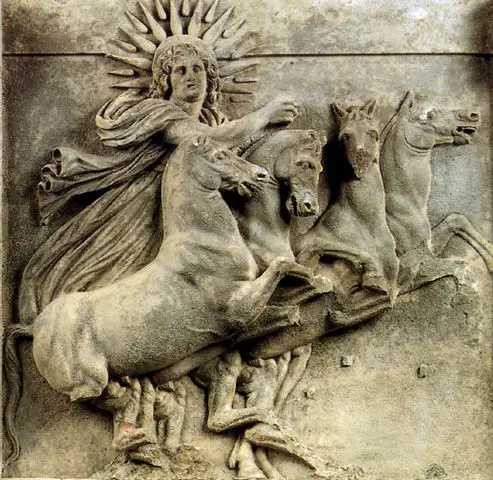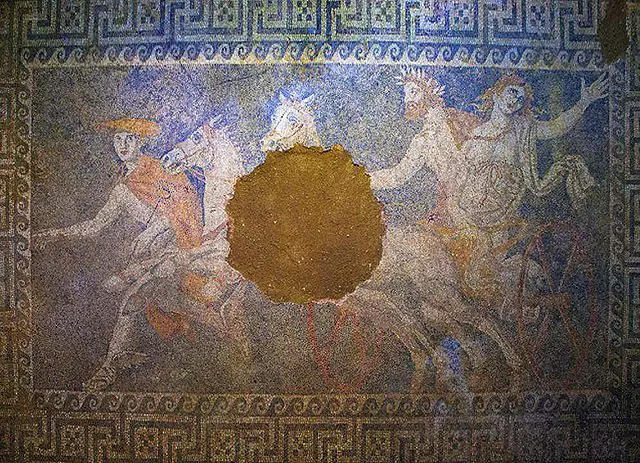| Further Reading | Was Ancient Greece Ever United? |
From the 7th-3rd century BC there are 4 major city-states which were the most important in classical Greece. During this time period the Greeks would fight off the Persians, build massive monuments, and forever change western history. Each of the following city-states played a vital role in the culture, power, and economy of classical Greece.
Historians today remember 4 city-states in Greece as being the most important. First, was Athens with its large population and advanced maritime trade. Second, was Sparta with its 3 tiered agrarian economy and powerful army. Third, was Corinth, the trading and diplomatic hub of Greece. Fourth, was Thebes with its ancient fortifications and strategic positioning.
Each of these city-states would at some point dominate the political landscape of ancient Greece. Below is an outline of why each of these city-states remain the most important in ancient Greece.
Here at The History Ace I strive to publish the best history articles on the internet. If at the end of this article you enjoyed it then consider subscribing to the free newsletter and sharing around the internet.
Without further ado, here are the 4 most important city-states of classical Greece.
Athens: The Most Populous And Wealthy Of The Classical City-States In Greece
| Further Reading | Athens: 3 Reasons Why Athens Was Not A True Democracy |
The first most important city-state in classical Greece was Athens.
This should come to nobody’s surprise. When most people think of classical Greece they think of large walls adorned with marble palaces and temples. This is the image of Athens.
However, statues and temples are now what made Athens so important and powerful in classical Greece. The reason that Athens ends up on this list is because of its maritime trade and massive wealth.
The economy of Athens was centered around two sectors. First, was the ‘slave’ labor force in the Athenian countryside, the Attica. Here wage workers would till the fields and produce the goods that would be shipped to the city of Athens.
The second sector of the Athenian economy in classical Greece was the advanced maritime trade routes that Athens controlled. Athens was a naval society that specialized from its inception in sea based trade across the Mediterranean and Aegean seas.
Historians to this day uncover Athenian trade routes that range from Italy to the Black Sea. This was because Athens would spend considerable money on founding ‘colonies’ of Greeks across the known world to help export products and goods back to Athens.
As a result of several centuries of this maritime trade and wage labor force in the Attica Athens would explode in both wealth and population. For the entirety of the time period of classical Greece Athens was the most populous city-state in Greece.
If you lived in ancient Greece the city of Athens would look as massive as Tokyo or New York City is to us today. Historians have presented arguments that the population of Athens was between 300,000-700,000 during the 5th century BC! This would have easily made Athens one of the most populated cities on the earth during that time.
As such, one of the most important city-states of classical Greece was Athens due to its massive wealth and population.
Sparta: The 3 Tiered Economy And Professional Standing Army
| Further Reading | The Ancient Spartan Economy: The 3 Sectors Of Ancient Sparta |
The second most important city-state of classical Greece is Sparta.
While Athens may have had the largest population and most wealth Sparta had the most ‘efficient’ economy. This efficient Spartan agrarian economy would allow for Sparta to field a professional and permanently standing military for which they are famous for today.
The Spartan economy was based around 3 sectors. Each of these sectors worked to support the others. Overtime as Sparta continued to grow in military and political power, so did their economy which was one of the few to successfully do so in classical Greece.
The first sector of the Spartan economy was the agrarian farms owned by the Spartan citizens and worked by captured helot slaves. Sometime around the 7th century BC Sparta would begin annexing other city-states surrounding their land. The captured slaves would then be ‘given’ land to be worked in and around Sparta. In return for this land they would owe a portion of the farmed goods to the Spartan citizens. This created a vibrant agrarian economy around classical Sparta.
Second, not every captured person was made a helot slave. The wealthier members of a captured Spartan state would become a Perioeci. These Perioeci held civil liberties somewhere between the Spartan citizens and helot slaves. The Perioeci were the only members of Spartan society allowed to freely leave Spartan territory, build a business, engage in trade, and hold money. Not even Spartan citizens were allowed to do this as it was feared they would leave Sparta for another city-state. This created a vibrant trade sector in classical Sparta.
The third sector of the Spartan economy was the rise of tributes paid by other city-states. Because Sparta was able to field a permanently standing military they were capable of pushing their influence upon other city-states to provide tribute to Sparta or risk being invaded. We know of several Spartan attempts to enforce tribute via military enforcement due to archeological evidence demonstrating a loss in Spartan male population from military engagements.
The classical city-state of Sparta became incredibly powerful because of this three tiered economy. Unlike other city-states from the ground up Sparta was designed to field a permanently standing military force. This was unique among the city-states of classical Greece and historians are still unsure why Sparta developed so differently.
However, it is because of this 3 tiered economy and permanently standing military that Sparta is the 2nd most important city-state in classical Greece.
Corinth: The Trading And Diplomatic Hub Of Classical Greece
| Further Reading | Corinth: 3 Reasons Ancient Corinth Is Significant To History |
The 3rd most important city-state in classical Greece is Corinth.
Corinth rose to prominence due to its geographic location in Greece. Located between Athens and Sparta on the 4 mile long isthmus of Greece Corinth was in a prime location to collect tolls and develop trade.
Further, Athenian trade ships looking to travel to the western side of Greece would have to pay Corinth to haul their boat the 4 miles overland on the Diolkos maritime land highway.
Because of this Corinth was located in the best spot in all of classical Greece. Corinth would build up a massive trading hub that both Spartan and Athens would engage with on a daily basis.
From this Corinth would become one of the most economically powerful city-states in classical Greece. While Athens might have been the most wealthy it was Corinth that controlled all of the economic trade in classical Greece.
This control of trade gave Corinth several benefits. First was that they were seen as a leader in classical Greece. On several accounts city-states would ask Corinth to mediate in wars and disagreements during the classical era of Greece.
During the Greco-Persian wars of the 5th century BC Corinth was selected as the headquarters of the Hellenic alliance. During this war the Greeks also decided that Corinth would be the best defended position should Athens fall.
Another benefit that Corinth had was it would use its wealth to hold the Isthmian Games. From these Olympic games held in honor of Poseidon Corinth would become a cultural center of classical Greece. As a result of these games the power and population of Corinth would explode. With this growth in population came an increase in culture. During the 4th century Corinth would come to be known for its luxury and decadence.
As such one of the main reasons why Corinth is one of the most important city-states of classical Greece is because it was a diplomatic and trade hub for all the classical Greek city-states.
Thebes: Known For Its Ancient Fortifications And Strategic Positioning
| Further Reading | Thebes: 3 Things This Ancient Greek City Is Known For |
The 4th most important city-state in ancient Greece was Thebes, the leader of the Boeotian confederacy.
Lying just northwest of Athens Thebes was one of the strongest city-states of ancient Greece. From the 7th century BC up through its destruction by Alexander The Great in the 3rd century BC Thebes would routinely stand against both Athens and Sparta.
Thebes was known during Classical Greece for being one of the most well defended city-states with massive fortifications. Lying in the northwest of Greece Thebes would lead a coalition of people called the Boeotians who were known to favor the city-state of Thebes due to its fortified location on the top of 5-6 large hills.
The city-state of Thebes would see countless invasions by both the Spartans and the Athenians. However, due to its remote location the city would always eventually repel the invaders. In 371 Thebes would demonstrate its military prowess at the Battle of Leuctra defeating the Spartan army and eventually coming to control the entirety of Greece for nearly 20 years before being defeated by Macedon in 346 BC.
Historians do not have many sources depicting the internal power of Thebes but we know from Spartan, Corinthian, and Athenian sources that Thebes was a massive threat for the entirety of the classical period.
On several occasions Thebes would successfully fight a series of proxy wars with both Athens and Sparta. Thebes never saw themselves as Greek as they sided with the Persians during the Greco-Persian wars. Herodotus details that out of the Persian forces the Theban military was the most formidable for the Spartan leaders to have to deal with.
Thebes would eventually fall after the Battle of Chaeronea in 338 BC between Theban dominance and Macedonian. After this battle Thebes would rebel against Macedonian rule and Alexander the Great would destroy the city of Thebes in retaliation in 335 BC.
However, while we don’t have many sources on Thebes we do know that they were by far one of the most important city-states in classical Greece from their effect upon the other city-states.
Conclusion
There you have it; an entire article going over the 4 most important city-states of classical Greece.
Classical Greece is a fascinating subject of research. We have so many sources that survive from the time period that detail the insane amount of varying cultures that existed in one small region of the world. Each of the major city-states had their own culture, economy, military, and government.
Here at The History Ace I strive to publish the best history articles on the internet. If you enjoyed this article then consider subscribing to the free newsletter and sharing around the internet.
Further, you can check out some of the other articles below.
-
How The American Revolution Changed The World

Here is how the American Revolution changed the world. Many people are not aware of just how important this event actually was.
-
Why The Roman People Loved Chariot Racing

Why did the Roman people love chariot racing? Well it all comes down to these 3 reasons.
-
The Design and Color of Roman Chariots

What was the design and color of Roman Chariots? Were they faster or slower then normal chariots? Well here is everything!
Sincerely,
Nick